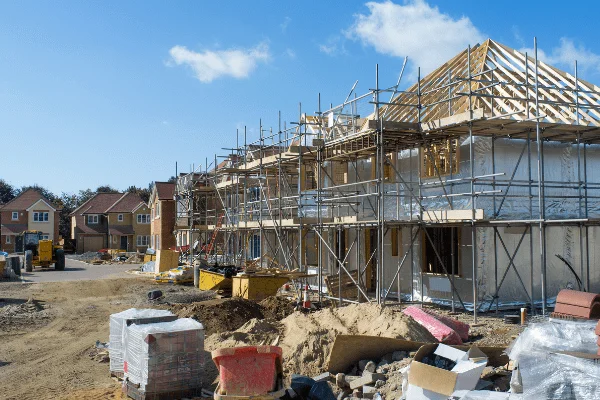Buildings Lower Than 18 Metres Now Exempt from Mandatory Fire Safety Checks
The requirement for people purchasing flats in smaller housing blocks to provide safety information to qualify for a mortgage has been scrapped. Government officials have confirmed that no longer will those buying flats in buildings lower than 18 metres need to verify the condition of the external walls and cladding, a safety measure brought in following the Grenfell Tower tragedy.
The change has been welcomed by major lenders, including Barclays, HSBC, and Lloyds, who said that industry guidance updates ensure clarity for lenders. Flat owners and prospective buyers have faced major problems selling and buying homes since 2017 due to concerns regarding the costs associated with the removal of flammable cladding.
72 people lost their lives in the Grenfell Tower tragedy four years ago, attributed primarily to the use of dangerous cladding on the exterior of the building. Subsequent investigations discovered that similar cladding remains in place on thousands of housing blocks across the UK.
Where projects have been undertaken to remove or replace the material, the costs have fallen to the owners of the flats within the building. Many of which have found themselves with negative equity and unable to sell their homes.
Mandatory safety assessments
In order to qualify for a mortgage, applicants looking to purchase a property in a tall building with potentially flammable cladding were required by mortgage lenders to provide a formal assurance of safety. This was provided in the form of a sign-off form, also known as EWS1, which was verified by a safety assessor to indicate that the building was not a high-risk property.
It was only those who owned flats in buildings known to be fitted with flammable external cladding that were required to obtain an EWS1. However, many mortgage lenders began expanding the requirements to a broader and more diverse range of buildings, making it difficult or impossible for thousands of prospective buyers to qualify for a mortgage.
Last week, Housing Secretary Robert Jenrick announced that the government’s guidance would be adjusted to exclude property owners in low-to-medium-rise blocks from this requirement. The statement from the government indicated that the move was prompted by updated advice from fire safety experts, who reached the conclusion that formal fire safety checks were not necessary for such properties.
“In the small number of cases [in purpose-built tower blocks below 18 m] where there are known concerns, these should be addressed primarily through risk management and mitigation,” Mr Jenrick said.
“Fire-risk assessors and lenders should not presume that there is a significant risk to life unless there is evidence to support this.”
“This would ensure that they respond only to the evidence and adopt a far more proportionate and balanced approach.”
He also stated that while he was satisfied with the positive response from most major lenders so far, not all mortgage providers had yet confirmed alterations to their lending policies.
“I hope and expect other lenders to follow suit swiftly,” he said.
House Building Alone Will Not Solve the Current Housing Crisis
There are two things driving the UK’s real estate sector’s record performance right now: the growing desire among movers and first-time buyers to escape the city and pick up spacious properties with private gardens and rock-bottom interest rates. This usually takes priority.
For some time now, mortgage rates have been hovering around all-time lows, and for those able to qualify for a mortgage, it has been a tempting venture. Particularly where larger deposits are being handed over, some mortgage rates available right now are lower than they have been in years.
You have to sympathise with what is fast becoming an entire generation of frustrated first-time buyers. Or should that be, would-be first-time buyers, who, for a string of reasons, are unable to capitalise on the lowest mortgage interest rates they may ever see in their lifetime?
Growing wealth inequality
Young people in droves are accepting that they are unlikely to ever own their own homes. It is an issue that is more prevalent in some parts of the UK than others, but it is nonetheless an undeniable crisis the whole country is facing.
Many continue to point the finger of blame squarely at the lack of new housing inventory. The government isn’t close to reaching its own house-building targets, meaning there simply aren’t enough affordable homes to go around. Even if the government were to fulfil its overly ambitious goals, chances are it would have little to no difference in average property prices.
Affordability is not something that changes overnight, particularly in an era of unprecedented demand. Give things a decade or so, and we could see added inventory knocking 3% off the average price of a UK home. As things are going right now, this is the kind of growth house prices are seeing every few months.
Irrespective of how many ‘affordable’ homes are built over the coming years, catastrophic wealth inequality is still going to price most first-time buyers out of the market.
Access to affordable mortgage rates
Another issue compounding the problem is the difficulties first-time buyers are facing when attempting to access today’s competitive mortgage rates. For most, coming close to saving a 20% deposit or even a 10% deposit has always been completely out of the question, highlighting the value and importance of the government-backed 5% mortgage initiative.
For the first time in a long time, first-time buyers were presented with the opportunity to qualify for a 95% LTV with a deposit of just 5%, until it became clear that OTT scrutiny and excessive affordability tests are making it all but impossible for most to qualify.
A 5% deposit mortgage is all well and good, but not if you can only borrow four times your annual income. Applicants without a good credit history are also being declined, as are those who took advantage of government grants or those who were furloughed during the COVID-19 crisis.
The addition of affordable inventory to the housing market would, of course, be welcome, but it is by no means a silver-bullet solution to the escalating housing crisis.
Is the UK’s Unprecedented Housing Bubble About to Burst?
Average UK house prices continue to set consecutive records with each passing month; it has never been more expensive to purchase a home in the UK or difficult for first-time buyers to get on the property ladder.
Months ago, even the most optimistic analysts had envisaged a year of relatively modest performance for the country’s real estate sector. Instead, what occurred was an unprecedented average house price increase of more than £22,000 over the past 12 months.
The growth vastly exceeded the potential £15,000 maximum stamp duty saving.
Looking ahead, more brokers and analysts are predicting an inevitable burst of the current housing bubble. With average house prices hovering at all-time highs across much of the country, experts believe that what goes up must eventually come down.
An end to frenzied and often blind purchases
Prior to the withdrawal of the stamp duty holiday on June 31, it had become the norm for desperate homebuyers to make offers on properties without even visiting them in person.
As this temporary buying frenzy tapers off, market watchers are predicting an inevitable toll on the pace of monthly property price increases. A major lack of inventory is likely to shield the sector from a major crash, but significant falls could be on the horizon.
“For anyone looking to purchase a property, the advice is simple: hang fire. If the statistics are reflective of anything over the past year, the stamp duty holiday is of benefit to only one side of the coin: the sellers,” commented Ross Counsell, a chartered surveyor at Good Move.
“If buyers can wait it out until the end of the new [tapered] deadline [of September 30], they should expect to save a significant amount of money.”
His sentiments were shared by Tom Bill, head of UK residential research at Knight Frank, who likewise predicted a gradual shift back to stability for the sector.
“Similarly to rising interest rates, there will be a financial hit from ending the holiday, but the wider point is that it signals a return to normality,” he said.
“The stamp duty holiday hasn’t just squeezed transactions into artificially short periods of time; it has also put people off entering the market.”
“A tax deadline there is no guarantee of meeting, together with stories of sealed bids, overworked conveyancing solicitors, and a shortage of removal vans will have deterred some.”
“Indeed, the second half of this year should see healthy levels of activity in the UK housing market. There is frustrated demand in the system, new supply is starting to pick up, and the labour market is stronger than most economists predicted six months ago.”
No immediate alterations are expected
Whether the housing bubble will eventually burst or not, most experts seem to agree that there are no major alterations expected on the immediate horizon.
“It is no secret that the property market has been on a rampage in the last year. Spurred on by various government initiatives—people unlocking savings and equity in their homes or simply rethinking their living arrangements—there has been massive demand for houses,” commented David Hannah, principal consultant at property firm Cornerstone Tax.
“The question on everyone’s mind is: What will the property market do next? It cannot go on forever increasing; however, the current market trajectory shows no major signs of slowing down; it is not yet time to worry about a bubble bursting.”
UK and Singapore come to an agreement on the landmark Financial Partnership for Financial Services
The UK and Singapore have come to an agreement on the landmark Financial Partnership for Financial Services.
A historical moment for financial relations has been made; signed by the chancellor, a new partnership between the UK and Singapore regarding financial services will boost jobs and investment in the UK.
- The Chancellor agrees to a new financial partnership between the UK and Singapore.
- Will facilitate closer regulatory cooperation and help boost jobs, trade, and investment.
- The UK and Singapore also commit to strengthening cooperation in areas such as green finance and cybersecurity.
This new agreement that supports financial services will facilitate closer cooperation and allow a greater data pool, thus revealing opportunities to boost investment and trade between the two countries.
This tactic is part of the government’s plan to make sure the UK remains the leading financial centre, marking an important development in the UK’s strategy in pursuing financial global dominance. Now the UK is independent of the EU. This has all been made possible by Rishi Sunak and Singapore’s Senior Minister and Chairman of the Monetary Authority of Singapore, Tharman Shanmugaratnam.
“It helps grow the economy and create jobs.”
After the signing, the Chancellor of the Exchequer, Rishi Sunak, had this to say:
“Our financial services industry helps to grow the economy and create jobs, and today’s agreement is a landmark step in showing the UK, as one of the world’s preeminent financial centres, is both open to the world and committed to maintaining the highest standards of regulation.
Our financial partnership will help increase investment and trade with Singapore and the Asia-Pacific region and boost collaboration in important areas such as fintech and green finance.”
The partnership is supported by a memorandum of understanding, which aims to reduce frictions for firms serving UK and Singapore markets by showing that each other’s financial services regulatory regimes have similar goals; an additional memorandum of understanding on cyber security was also signed, providing a formal basis for cooperation between the UK and Singapore on the finance sector’s cyber security.
Stamp Duty Savers May Have Actually Lost Out, Experts Claim
The stamp duty holiday in England and Northern Ireland was introduced to motivate movers and first-time buyers to take action in order to stimulate the stagnant housing market. Many thousands took full advantage of the offer, making savings of up to £15,000 on typical stamp duty liability.
Property experts are now claiming that the “knock-on effects” of the stamp duty holiday have actually left most new homeowners out of pocket. Even where the maximum £15,000 saving was leveraged, skyrocketing property prices have resulted in buyers paying more than they would have prior to the initiative’s introduction.
Commenting on behalf of Cornerstone Tax, principal consultant David Hannah highlighted the effects a sudden spike in demand has had on the housing market. According to the latest figures from Nationwide, average property prices have increased approximately 13.4% over the course of the past year.
This equates to around £22,000, significantly more than the £15,000 maximum stamp duty saving.
Consequently, many homebuyers will have found that the savings they made were nullified by the additional costs of purchasing a property.
The rush to borrow money
Others were so preoccupied with rushing home purchases that they unwittingly took out mortgages that were not the most cost-effective options available. Research suggests that up to 2.4 million movers over the past year overpaid by many thousands of pounds, having not selected the most economic products to suit their requirements.
In addition, approximately 13% were forced to borrow additional money at a cost in order to pay the fees associated with home purchases that they had not budgeted for.
Estimates now suggest that the average cost of moving house has risen to just under £9,000; combined with the enormous spike in average house prices over the past 12 months, the potential £15,000 stamp duty saving pales in comparison to the additional costs.
An inevitable bubble
Mr Hannah went on to comment on the real estate market’s current lack of stability while emphasising the importance of affordable homes as a means to solve the country’s growing housing crisis.
“The initial saving was obviously enticing; however, as the holiday and therefore the property market gathered momentum, the knock-on effects of this have resulted in an increase in costs for many buyers, rather than the huge savings initially hoped for,” he said.
“Of course, a spark in the property market has knock-on effects for the rest of the economy, providing work and growth for everyone involved in building, selling, processing, and moving people into homes.”
“However, growth must be sustainable and stable, and if we want people to really benefit from a better property market, we need more homes that are more affordable to more people—and to avoid a bubble bursting.”
June Property Price Growth Escalates to a Sixteen-Year High
June saw the highest annual property price growth since February 2007, with an incredible 10.7% rise in house prices. Take away the London growth rate figures, and that figure rises even higher to a huge 13.9%.
The East of England and the North West have seen a dip in growth rates in the month of June, but only very slightly. It’s been over a year since any area of the UK saw a fall in house prices, in spite of the pandemic and its catastrophic effect on the UK economy.
June showed the North West to be ahead of the game, with property prices showing an annual increase of 17.3%. Data shows the North West has taken the lead in the tables for the last nine months. Areas that have shown the most growth are Greater Manchester (23%), Warrington (22%), and Merseyside (19%).
Over the previous seven months, the areas that have shown the lowest annual house price growth include Greater London and the East of England, with Greater London having the lowest growth of just 1.2%. House prices in London dropped a huge 7.4% in May when compared to the previous year. Prime central London areas have seen dramatic house price drops as buyer habits changed due to the pandemic, opting for larger properties outside the city. On a month-to-month basis, June saw a rise of just 0.8%, although an improvement from March to May’s negative rates.
Director Richard Sexton stated:
“Over the last twelve months, our index has shown the average price of a home sold in England and Wales has increased by some £32,500, or 10.7%. If we exclude London from this, then the figure is a very considerable 14%. Nevertheless, even including the capital, this is the highest annual rate since February 2005. It is now fourteen months since any of the areas in our index have recorded a fall in house prices, and this is while the UK economy has been under the severest pressure it has faced in living memory.
“Any slowing of price rises in the period of March to May because of the initial expected end of the stamp duty holiday has been short-lived. This is in part because of the extension of the holiday but also because of the more general optimism in the economy, which has seen many transactions that were previously postponed come back online.
“Mid-April, even before the stamp duty holiday ends, the government has introduced further fiscal support in the shape of its 95% loan-to-value mortgage guarantee scheme. This is giving continued support and confidence to borrowers and mortgage lenders, many of whom have re-introduced their own higher LTV lending to the market. This is good for the market and for home movers.
“This fiscal support, combined with the UK’s monetary policy of historically low-interest rates, continues to make home moves more affordable and has meant buyers can take advantage of cheaper borrowing and the savings they have made in lockdown to make their home moves.”
How Advisers Can Better Support Clients in a Turbulent Economic Climate
The financial impact of the COVID-19 pandemic is likely to be felt by the people of the UK for some time. Job security has gotten steadily worse, investment performance has been turbulent, and savings rates have been slashed.
Consequently, it is of little surprise that more people are turning to financial advisers and brokers for advice. This constitutes an important opportunity for advisers to play a key role in helping their clients negotiate the economic uncertainty that lies ahead.
What all advisers must do
First, advisers need to acknowledge and appreciate the fact that their client’s circumstances will be extremely varied and dynamic from one to the next. Some may have held onto their jobs and even prospered, resulting in additional savings for potential investment purposes.
Elsewhere, many entrepreneurs and self-employed workers may have largely missed out on the government’s financial support package. In this case, they could be in a much more vulnerable position than they were prior to the pandemic.
Consequently, it is essential for advisers to dig as deep as possible to understand why a customer may have reached a decision regarding a specific financial product or strategy. All of these must fall within due diligence protocols, along with FCA guidance on how sensitive conversations should be broached.
Essential safety net
Brokers and financial advisers are interpreted by their customers as important safety nets in difficult times. They provide access to the information and insights needed for educated decisions to be made.
Now more than ever, it is essential for advisers to adopt a dynamic, thoughtful, and creative approach when providing guidance. This includes familiarising clients with products, services, and options in general they may not be aware of. For example, tools like equity release, where there are cash flow issues, methods of reducing tax obligations, and how to safeguard savings for the long term,
When providing support and suggestions, advisers also need to be mindful of how the financial position of the client could result in them needing different types of support.
With younger people, the main goal could be to mitigate as much financial disruption as possible from the COVID-19 crisis to enable them to get on the housing ladder. For clients approaching retirement, the main objective could be to ensure they get maximum value from their pension savings and continue to generate an income stream, even when they have retired.
Unprecedented events and economic uncertainty
In times of widespread economic uncertainty, advisers have the unique opportunity to simplify and improve the lives of the clients they work with. Ultimately, it is up to the customer to make all the important decisions regarding their financial position, objectives, and any action to be taken.
However, it is the responsibility of the adviser to provide them with all the information, insights, and support they need to ensure they make informed decisions.
Following a year spent primarily in lockdown, the priorities of most people have shifted radically from pre-pandemic times. Subsequently, advisers must provide an increasingly flexible, accommodating, and proactive service in order to help their customers overcome the challenges of the past year and the ones yet to come.
Importance of Good Advice at an All-Time High, Says Fleet Mortgages CCO
Late last week, Brightstar Group’s Specialist Lend Virtual Expo and a side panel of specialist finance brokers got together to discuss the current lending landscape. The annual event is held to enable brokers to share and access the insights needed to provide better service to their customers.
The day-long event was organised to offer the latest insights to help introducers develop and grow their specialist mortgage businesses.
Representatives of some of the most notable specialist lenders in the UK attended the event, including Together, Fleet Mortgages, United Trust Bank, and many more.
A perfect storm
Along with a panel discussion on ‘the state of the specialist lending nation’, the UK’s turbulent buy-to-let market was also discussed at length. Chief commercial officer at Fleet Mortgages, Steve Cox, said that the sector is currently in the midst of a “perfect storm” resulting from rising tenancy demand and low-interest rates.
Consequently, he stated that the importance of distributors and specialist lenders providing quality advice for the benefit of their clients is at an all-time high. He said this was particularly true for those who may have faced credit issues over the course of the past year as a result of the COVID-19 crisis.
“These customers are not easily placed on the high street; they absolutely need a mortgage broker and quality advice at the epicentre of their housing needs and wants for the foreseeable future,” he said.
His sentiments were shared by Vida Home Loans corporate sales manager, Chris Holcomb, who said that although the long-term outlook for the sector is good, the effects of COVID-19 are likely to be felt for some time to come.
“Specialist lenders have become vital in making sure these landlords have access to the support they need,” he commented, in relation to landlords who may have incurred credit score damage during the pandemic.
“With a new generation of borrowers with impaired access to credit, many landlords will need the support of a strong specialist lender that takes a flexible and human approach to lending, especially when dealing with complex circumstances.”
Another successful event
Celebrating the conclusion of another successful meet-up, Brightstar Group CEO Rob Jupp called the event a ‘ground-breaking moment’.
“It’s absolutely wonderful to be able to achieve another ground-breaking moment by hosting such a well-run, well-supported, and well-attended event,” he said.
“I’m extremely proud of Michelle Westley [head of marketing at Brightstar Group] and her fabulous marketing team.”
To which Ms Westley added, “We put a lot of work into creating The Specialist Lending Virtual Expo and developing a content programme that could make a tangible difference to broker businesses.”
“So, we are really delighted that so many brokers turned up on the day and that there was such great engagement with all the 16 exhibitor stands, the panel debate chaired by Rob Jupp, and the 11 keynote speakers.”
“Overall, just over 300 delegates attended the event, and we are already receiving really positive feedback.”








